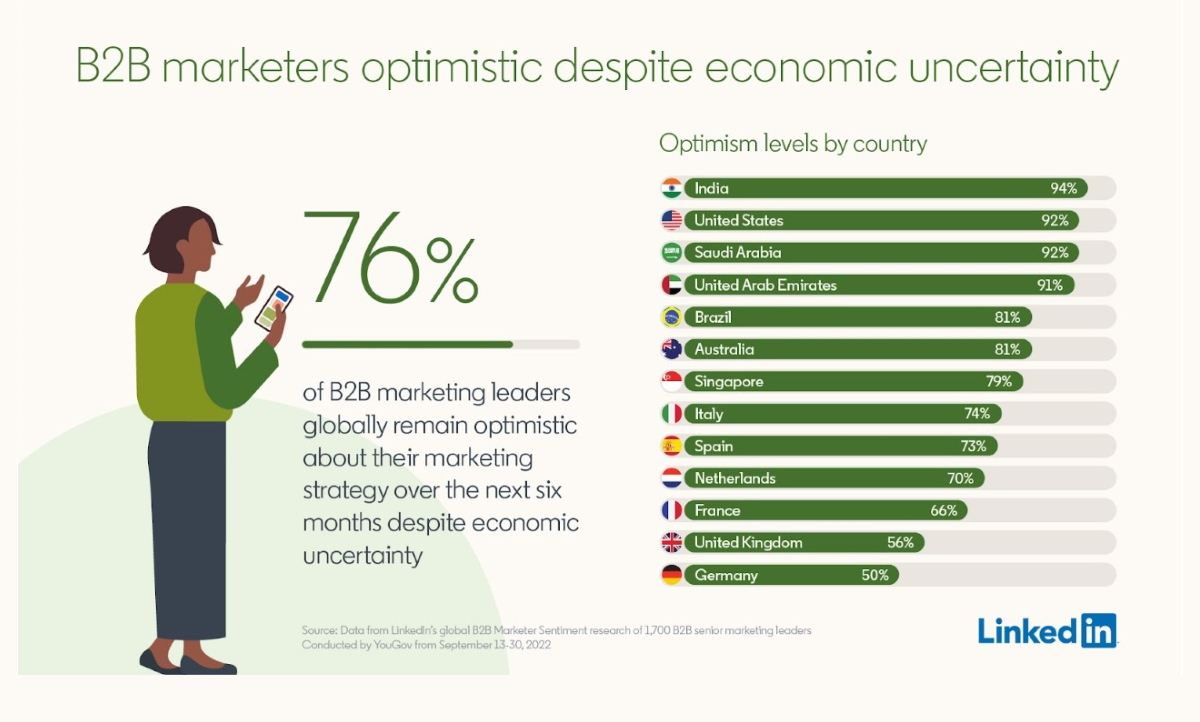With the ongoing economic crisis, nearly half of the business-to-business global marketing leaders agree that their business has been affected in a number of ways. However, over seventy-six percent of them are confident in the marketing strategies they have planned for the next six months.
The study is based on data collected from LinkedIn. According to the findings observed after overviewing 1,700 global marketing heads, the confidence shown by them may vary from region to region. While ninety-four percent of the survey participants from India showed a positive attitude towards their strategy, on the other hand, only 56% of those from the United Kingdom showed trust in their future plans.
India was followed by Saudi Arabia with 92% and then the United States of America with 91% of respondents showing confidence in their future ideas.
One thing upon which everyone agreed was to build their brand. Sixty-seven percent of them are planning to spend more on this, while fifty-two percent think the stronger the brand is, the more sales they can cash in, and thirty-eight percent believe a strong brand attracts more customers.
The study also showed that having long-term planning is not the only thing that leads to building a brand; explaining these strategies to their respective shareholders is also important. However, 30% of these survey participants believe that their collaborators do not understand the process.
Twenty-eight percent intend to use the next six months to improve their understanding of their customers, while twenty-two percent may reconsider their plans. The upcoming campaigns will mostly be based on customer satisfaction, better brand promotion and showing their struggle to maintain their spot in the market.
According to Tom Pepper, senior director at LinkedIn marketing solutions, watching brand leaders be positive despite the economic crisis is a good thing as they are still focusing on ways in which their brands can grow. Taking steps such as spending less on ads is a good step, but only for the short term. Hence, they should keep putting in effort to build their brand.
Read next: $2.5 billion was stolen by blockchain attackers in the first three quarters of 2022
The study is based on data collected from LinkedIn. According to the findings observed after overviewing 1,700 global marketing heads, the confidence shown by them may vary from region to region. While ninety-four percent of the survey participants from India showed a positive attitude towards their strategy, on the other hand, only 56% of those from the United Kingdom showed trust in their future plans.
India was followed by Saudi Arabia with 92% and then the United States of America with 91% of respondents showing confidence in their future ideas.
One thing upon which everyone agreed was to build their brand. Sixty-seven percent of them are planning to spend more on this, while fifty-two percent think the stronger the brand is, the more sales they can cash in, and thirty-eight percent believe a strong brand attracts more customers.
The study also showed that having long-term planning is not the only thing that leads to building a brand; explaining these strategies to their respective shareholders is also important. However, 30% of these survey participants believe that their collaborators do not understand the process.
Twenty-eight percent intend to use the next six months to improve their understanding of their customers, while twenty-two percent may reconsider their plans. The upcoming campaigns will mostly be based on customer satisfaction, better brand promotion and showing their struggle to maintain their spot in the market.
According to Tom Pepper, senior director at LinkedIn marketing solutions, watching brand leaders be positive despite the economic crisis is a good thing as they are still focusing on ways in which their brands can grow. Taking steps such as spending less on ads is a good step, but only for the short term. Hence, they should keep putting in effort to build their brand.
Read next: $2.5 billion was stolen by blockchain attackers in the first three quarters of 2022


